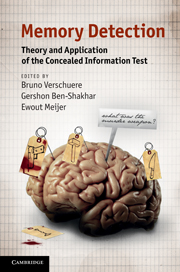Book contents
- Frontmatter
- Contents
- List of figures
- List of tables
- Notes on contributors
- Acknowledgments
- Part I Introduction
- Part II The laboratory: theoretical and empirical foundations of the Concealed Information Test
- Part III Field applications of concealed information detection: promises and perils
- 8 Limitations of the Concealed Information Test in criminal cases
- 9 Validity of the Concealed Information Test in realistic contexts
- 10 Leakage of information to innocent suspects
- 11 Countermeasures
- 12 Psychopathy and the detection of concealed information
- 13 Clinical applications of the Concealed Information Test
- 14 Daily application of the Concealed Information Test: Japan
- 15 The Concealed Information Test in the courtroom: legal aspects
- Part IV Conclusions
- Index
- References
8 - Limitations of the Concealed Information Test in criminal cases
Published online by Cambridge University Press: 05 June 2012
- Frontmatter
- Contents
- List of figures
- List of tables
- Notes on contributors
- Acknowledgments
- Part I Introduction
- Part II The laboratory: theoretical and empirical foundations of the Concealed Information Test
- Part III Field applications of concealed information detection: promises and perils
- 8 Limitations of the Concealed Information Test in criminal cases
- 9 Validity of the Concealed Information Test in realistic contexts
- 10 Leakage of information to innocent suspects
- 11 Countermeasures
- 12 Psychopathy and the detection of concealed information
- 13 Clinical applications of the Concealed Information Test
- 14 Daily application of the Concealed Information Test: Japan
- 15 The Concealed Information Test in the courtroom: legal aspects
- Part IV Conclusions
- Index
- References
Summary
Overview: The Concealed Information Test (CIT) has enjoyed a longer and more energized scientific interest than concern-based methods like the probable-lie Comparison Question Test (CQT). The roots of the CIT and CQT methods in polygraphy can be traced to the United States, and variations of both approaches are taught in virtually all polygraph schools. Despite scientific advocacy for the CIT, polygraph examiners rarely employ it in most countries. In this chapter practical and cultural factors are offered as possible reasons why the CIT did not become the preferred method in the field. The end of the chapter includes suggestions to practitioners, agencies, and scientists on how to expand the use of the CIT.
Since the introduction of the Concealed Information Test (CIT; Lykken, 1959, 1960) this approach has garnered almost universal appeal among scientists who have taken an interest in deception detection. There are about six dozen countries where the polygraph is used for deception detection (Barland, 1999), but the CIT has been adopted by field practitioners to a significant degree in only one of them (Japan). Despite its more firm theoretical foundation and simple elegance over the more popular Comparison Question Techniques (Raskin and Honts, 2002), polygraph examiners have largely ignored the benefits that the CIT offer. The purpose of this chapter is to review the factors that may have limited the CIT's application to real-world criminal investigations.
Information
- Type
- Chapter
- Information
- Memory DetectionTheory and Application of the Concealed Information Test, pp. 151 - 170Publisher: Cambridge University PressPrint publication year: 2011
References
Accessibility standard: Unknown
Why this information is here
This section outlines the accessibility features of this content - including support for screen readers, full keyboard navigation and high-contrast display options. This may not be relevant for you.Accessibility Information
- 9
- Cited by
